Anna was a 29-year-old mother of two when she attended her GP with symptoms of headaches and a lump on the right side of her neck. Her GP referred her to Northampton Hospital's head and neck department under the two-week wait rule for suspected cancer.
She was seen by a consultant ENT (ear, nose, throat) surgeon, who did not consider she had cancer, and referred her for a scan and physiotherapy. He removed her from the pathway.
The scan was reported as normal, and no follow up appointment was made.
Anna underwent physiotherapy as advised, but did not get any relief from her symptoms. Her physiotherapist informed her consultant of this, but failed to arrange further review or undertake investigations into Anna's persisting symptoms.
Over the next six months, Anna visited her GP several times before she was referred for an MRI. Instead of an MRI, a CT scan took place. It was wrongly reported as normal with no further action to be taken. Had it been appropriately reviewed, it would have identified a nasopharyngeal tumour, and Anna would have been referred to the ENT team for further investigations and treatment.
Anna continued to experience symptoms. Although she continued to go to her GP, she was reassured by the above findings. Fifteen months later, she was referred again under the two-week pathway for suspected cancer. While waiting for this appointment, Anna attended A&E due to worsening symptoms. A CT scan identified abnormalities, and she was urgently referred to the ENT team.
Anna was seen by the same consultant who had taken her off the pathway almost two years earlier. Further investigations followed, and Anna was diagnosed with a nasopharyngeal carcinoma at an advanced stage. Her care was transferred to the Royal Marsden Hospital, where she has undergone multiple cycles of chemotherapy and radiotherapy.
Unfortunately, her cancer has metastasised and spread. It is no longer curable, and she is on palliative treatment, with a severe reduction in life expectancy. She has two children under the age of 10.
Anna instructed Arti to investigate a case on her behalf. With the support of expert evidence, Arti argued that with earlier investigation and diagnosis, Anna's treatment would have commenced earlier, and she would have been cured.
The defendant accepted there had been a failure to arrange a follow up appointment after physiotherapy, and that a lesion could be seen on the first CT scan. However, it denied causation, arguing that Anna's condition and prognosis would have been the same even with earlier treatment.
Court proceedings were issued and served, and expert evidence was exchanged. Settlement negotiations followed, and Arti was able to secure a six-figure sum for Anna and her family. The settlement was more than 12 times the value of the first offer made to Anna by the defendant.
At the end of the case, Anna said:
"Arti was recommended to me by a friend whom she had also represented. From the very first day, she understood how important making the most of the time I had left was, and always did her best not to disturb me while working hard silently in the background, always with my best interests in mind.
"She is extremely professional and has a lot of experience, finding the best experts to help with my case, and fighting to get me the best result possible. My family and I would like to thank Arti genuinely from the bottom of our hearts for putting in so much effort and hard work into my case, and getting a result which provides me with some peace of mind that my children's future will be secure. I would have no hesitation in recommending Arti."
*(name changed)
Contact us
For further information about delayed diagnosis claims and medical negligence compensation claims, please call Arti Shah on 03304606739 or email arti.shah@fieldfisher.com.Alternatively
- You can speak to our medical negligence lawyers on freephone 0800 358 3848
- email us: personalinjury@fieldfisher.com
- Complete the short online enquiry form

